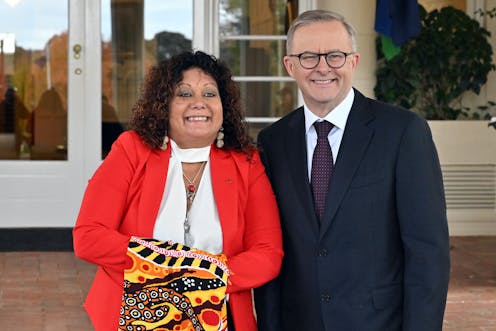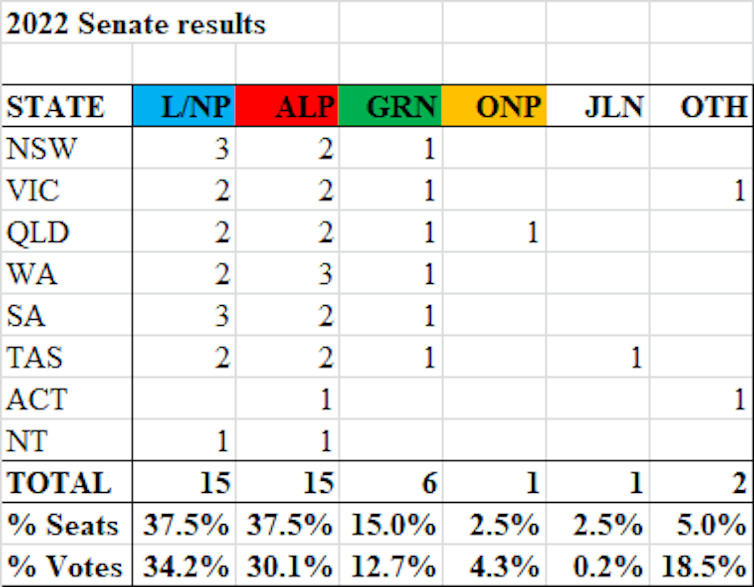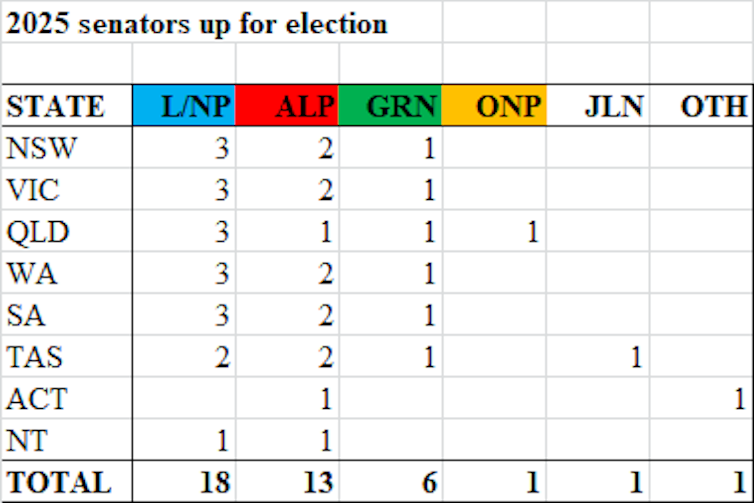
The final buttons to electronically distribute preferences for the Senate were pressed in NSW, Victoria and Western Australia on Monday. I wrote about the distribution of preferences in Queensland, South Australia and Tasmania on Saturday, and the climate activist’s David Pocock’s ACT Senate victory on Tuesday.
Read more: More Senate results: Hanson wins easily, but Labor still on track for a friendly Senate
All states have 12 senators, with six up for election at half-Senate elections. A quota is one-seventh of the vote, or 14.3%. State senators are elected for six-year terms beginning July 1, barring a double dissolution.
Final primary votes in WA were Labor 2.42 quotas, the Liberals 2.22, the Greens 1.00, One Nation 0.24, Legalise Cannabis 0.24, the Christians 0.15 and UAP 0.15. The outcome was three Labor, two Liberals and one Green, with Labor gaining from the Liberals.
This was a crucial victory for Labor, because it means Labor, the Greens and Pocock will have a combined 39 of the 76 senators, enough to pass legislation opposed by the Coalition.
The preference distribution shows that One Nation was well ahead of the third Liberal when the Liberals were excluded: 0.71 quotas for Labor’s third candidate, Fatima Payman, 0.61 One Nation and 0.46 Liberals.
Had Liberal preferences heavily favoured One Nation, Payman would have lost, but non-exhausting Liberals were about 50-50, with Payman defeating One Nation by 0.85 to 0.75 quotas.
In Victoria, final primary votes were Coalition 2.26 quotas, Labor 2.20, the Greens 0.97, UAP 0.28, Legalise Cannabis 0.21 and One Nation 0.20. Two Coalition, two Labor and one Green were elected, with the UAP’s Ralph Babet defeating the Coalition’s Greg Mirabella for the final seat to gain this seat from the Coalition.
ABC election analyst Antony Green said Babet led One Nation by 0.44 quotas to 0.40 when One Nation was excluded, and gained over 50% of their preferences. Had Mirabella beaten Labor into third, he may have benefited from Labor preferences.
But he trailed Labor by 0.50 quotas to 0.55 with Babet on 0.64. Babet extended his lead on Mirabella’s preferences to win by 0.83 quotas to 0.69 for Labor.
Final primary votes in NSW were 2.57 quotas for the Coalition, 2.13 Labor, 0.80 Greens, 0.29 One Nation and 0.24 UAP. Three Coalition, two Labor and one Green were elected. This was a Greens gain from Labor.
Analyst Kevin Bonham said the third Liberal, Jim Molan, defeated One Nation by 2.4%, down from a 4.0% primary vote gap.
Overall Senate results
The outcome of this half-Senate election is 15 Coalition out of 40 (down three including a gain from a defector), 15 Labor (steady), six Greens (up three), one One Nation (steady), one Jacqui Lambie Network (JLN) (up one), one UAP (up one) and one Pocock (up one). The defector from the Coalition in the NT and two Centre Alliance in SA (one a defector) all lost their seats.
Other than the states listed above, the JLN gained from the Liberals in Tasmania, the Greens gained from the LNP in Queensland, the Liberals and Greens gained from two Centre Alliance in SA, David Pocock gained from the Liberals in the ACT and the NT Country Liberals gained from a defector.
The overall Senate is 32 Coalition out of 76, 26 Labor, 12 Greens, two One Nation, two JLN, one UAP and one Pocock. On legislation opposed by the Coalition, Labor will need the Greens and one of the six Others, most likely Pocock or the JLN.
It’s the highest Senate representation for the Greens, reflecting their wins in all states at the last two half-Senate elections.
The table below shows the results for this election by state and nationally. ONP is One Nation and Others are UAP in Victoria and Pocock in the ACT.

The JLN won one seat on just 0.2% of the national vote. They only contested Tasmania, which is easily the least populous Australian state, but all states have 12 senators.
There are many Other parties, but their voters don’t usually like each other, so they struggle to win seats. Left-wing Others prefer Labor and the Greens ahead of right-wing Others, and right-wing Others prefer the Coalition and One Nation.
Senate primary vote swings were different from House of Representatives swings
Antony Green has a table of the final national Senate vote. The Coalition won 34.2% (down 3.8% since 2019), Labor 30.1% (up 1.3%), the Greens 12.7% (up 2.5%), One Nation 4.3% (down 1.1%), UAP 3.5% (up 1.1%) and Legalise Cannabis 3.3% (up 1.5%).
House of Representatives national votes were 35.7% Coalition (down 5.7%), 32.6% Labor (down 0.8%), 12.2% Greens (up 1.8%), 5.0% One Nation (up 1.9%), 4.1% UAP (up 0.7%) and 5.3% independents (up 1.9%).
The reason for the swing to One Nation in the House, but a swing against in the Senate was that One Nation contested 149 of the 151 house seats, up from 59 in 2019. In the Senate, One Nation contested all states, as they had in 2019. So the Senate swing is a better guide to One Nation’s overall support.
As One Nation is a right-wing party, they took votes away from the Coalition by contesting almost every House seat. Labor’s House vote was down due to the teal independents, who were not factors in the Senate apart from Pocock in the ACT.
Senators up at next half-Senate election
These are the senators who will be up for election if the next election is a normal half-Senate election. That election would need to be held by May 2025.

The four ACT and NT senators only have three year terms, while the state senators up are the ones who were elected in 2019. In every state except Tasmania, the Coalition will be defending three seats. Another bad election for the Coalition would be costly in the Senate.
The Greens will be defending their seats in every state, while Pocock will be defending his ACT Senate seat.
LNP easily holds Callide at Queensland state byelection
At Saturday’s Queensland state byelection for Callide, the LNP crushed Labor by 71.4-28.6, a 5.6% swing to the LNP since the 2020 state election. Primary votes were 49.8% LNP (down 7.4%), 19.6% Labor (down 6.1%), 14.4% One Nation (did not contest previously) and 9.8% Katter’s Australian Party (up 1.4%). The Greens did not contest the byelection.
This byelection was caused by the resignation of LNP member Colin Boyce to contest the federal seat of Flynn, which he won.
Macron’s coalition loses majority in French legislative elections
I covered Sunday’s French legislative elections for The Poll Bludger. President Emmanuel Macron’s Ensemble coalition lost its majority, and will probably depend on the conservative alliance to pass legislation. Both the left and the far-right made big gains.
Also covered: two Conservative-held UK byelections that occur this Thursday, and US President Joe Biden’s ratings are now worse than Donald Trump’s at this point in both their presidencies.
Adrian Beaumont does not work for, consult, own shares in or receive funding from any company or organisation that would benefit from this article, and has disclosed no relevant affiliations beyond their academic appointment.
This article was originally published on The Conversation. Read the original article.







